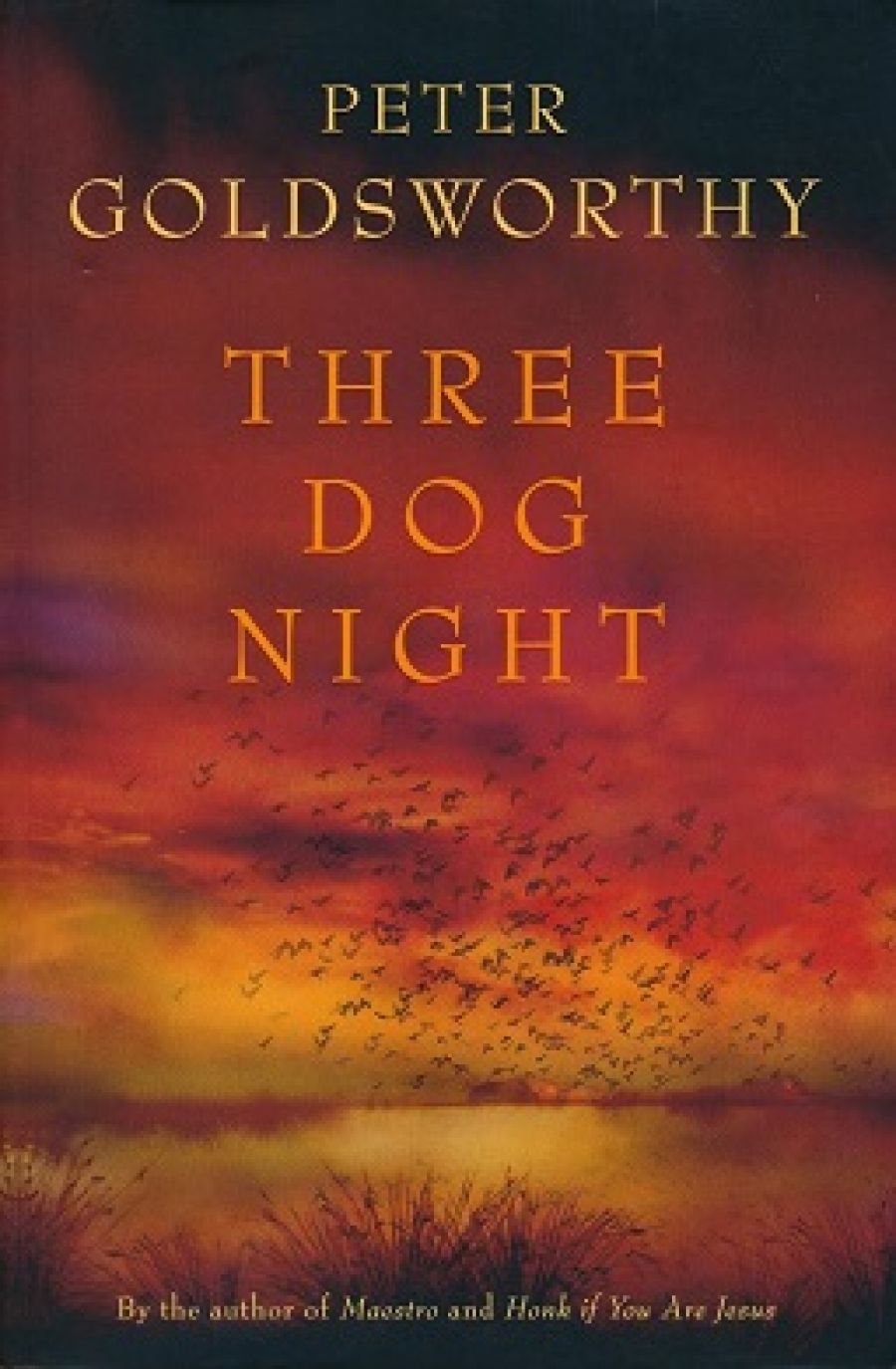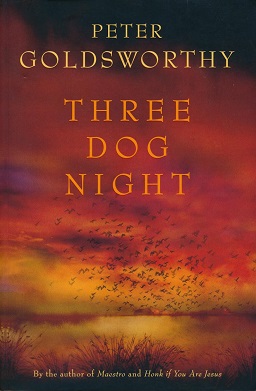
- Free Article: No
- Contents Category: Fiction
- Review Article: Yes
- Article Title: Rumbles in the Zeitgest
- Online Only: No
- Custom Highlight Text:
It is difficult for non-Aboriginal novelists to deal adequately with Aboriginal experience in their work. There are many reasons for this, not the least of which is general ignorance about Aboriginal experience. But another, more insidious, reason is self-censorship. The politics of speaking in an Aboriginal voice, if you’re not Aboriginal, is at best fraught and at worst a nightmare. Thinking twice before embarking on such an ‘adventure’ is no bad thing, a counter-balance, perhaps, to the days when it was all too easy to usurp an indigenous point of view, days of racist triumphalism or paternalist do-goodism.
- Book 1 Title: Three Dog Night
- Book 1 Biblio: Penguin, $29.95 pb, 341 pp
- Book 1 Cover Small (400 x 600):

- Book 1 Cover (800 x 1200):

A good example of having second thoughts, albeit retrospectively, is Thomas Keneally’s distancing himself from The Chant of Jimmie Blacksmith (1972) as the work of ‘a fucking madman’. This quote comes from an interview Keneally gave in 1995 for Peter Pierce’s book Australian Melodramas: Thomas Keneally’s Fiction. Pierce explains that ‘this remark refers not only to personal difficulties which Keneally experienced during [1971–72 when writing Jimmie Blacksmith], but to his judgement in hindsight that “the two cultures are so different in their maps of the world that it was reckless to do it”’.
But there may be a rumble of change in the Zeitgeist: a new willingness to try something ‘reckless’. You can hear it in Alex Miller’s Journey to the Stone Country (2002), a novel with an Aboriginal character in a central role. You can also hear it in Germaine Greer’s recent Quarterly Essay, ‘Whitefella Jump Up: The Shortest Way to Nationhood’, which challenges white Australians to identify themselves as Aborigines. Perhaps we have reached a new stage in an ongoing debate?
Still, it’s a brave book nowadays that deals with Aboriginal social relations and especially initiation rituals in as direct and uncompromising a manner as Peter Goldsworthy does in his latest novel. Throughout Three Dog Night, but especially in the third of the book set in the desert west of Alice Springs, there is a real sense in which Goldsworthy is consciously testing the limits of what he can and can’t say about, for and through Aboriginal people – even allowing for the device of putting words in the mouths of various unreliable and unsavoury white characters and certain enigmatic and ‘unknowable’ indigenous ones. There is an horrific depiction of penile subincision practised during some Aboriginal initiation ceremonies. There are discussions about organised tribal wife-stealing raids, payback spearings, and Dreamings. The plot detours around details of uncanny, preternatural ‘magic’. Thankfully, there is no ridiculous New Age seriousness in any of this, rather an occasional ironic reminder that if you think this stuff is weird, then you haven’t been reading Leviticus, the Greek myths or Freud lately.
Goldsworthy often wears his origins as a poet on his sleeve: his language is sensuous, metaphorical and always on the prowl, looking for hidden meanings. He is a metaphysical poet in that the writing is bristling with ideas. There is a constant intellectual argument going on beneath the glittering surface of the language.
In Three Dog Night, the narrator, Martin Blackman, has returned to Australia with his English wife, Lucy, after ten years studying and working in London. He and Lucy are psychiatrists and have accepted postings to Adelaide – a small pond after London. This affords Martin a sense of academic promotion, but also allows him to show his wife his home town. It also allows him to show his ‘trophy’ wife off to his old school buddies.
Goldsworthy exercises his poetic licence early in the book. As Martin drives Lucy into the Adelaide Hills to meet his best friend, Felix Johnson, the world vibrates like an ecstatic vision, a reflection of Martin’s inner excitement:
The day has taken its name to heart: a Sunday from the glory box of Sundays, a luminous morning saturated with sunlight and parrots. Happiness rises in my throat, thick as cud; the world outside the car, wholly blue and gold seems almost too much for my senses, too tight a squeeze.
‘Paradise’, Lucy murmurs, smitten.
Dante and Beatrice cruising through Outer Paradise in a red hatchback – and we’re only on the first page. Unfortunately, there’s only one direction to go after paradise. Sure enough, the snake in the grass appears when Martin and Lucy arrive at Felix’s property.
Felix had been to high school and medical school with Martin. When the latter went to London, Felix took a mirror path into the central Australian desert to work as a doctor on an Aboriginal settlement, where he underwent full initiation into the Warlpiri. Sarcastic, mocking and downright rude, Felix infects the novel from the moment he appears. Even when we discover that he has hepatitis C and, later, that he is dying of liver cancer, I couldn’t dredge up much sympathy for him.
The plot then turns into a kind of hybrid of Walkabout and Indecent Proposal. Felix worms his way into Lucy’s affections and convinces both her and Martin that she should make him happy in his last days. This entails not only a couple of dinner dates but, finally, escorting Felix back to his tribal ‘country’ in Central Australia. Felix’s motives for the desert journey are never clear – does he actually believe that he may be magically cured there by Aboriginal ‘medicine’, is it truly his spiritual heartland, or is this just the last self-indulgence of a bitter and nasty man?
That both Martin and Lucy agree to Felix’s escalating series of physical and psychological demands is unfathomable and, at the same time, absolutely necessary for the plot to evolve towards its tragic climax. Human beings, after all, do the most inexplicable things. For all its bristling ideas and poetic language, this book is a tragedy about love, friendship and betrayal, and tragedies are built on characters acting in extremis.
Martin’s sense of self begins to unravel as first his friendship and then his marriage are put to the test. His smug certainty of his own place in the world manifested at the beginning of the book is replaced by a grim, sullen doggedness. Felix’s impending death cuts Martin’s preoccupations down to size, and Lucy’s strange determination to comfort Felix marginalises her husband even more. No longer in control of the narrative, displaced by the action that happens off-stage, Martin can only ruminate on his powerlessness and feed his growing jealousy.
This is another measure of Goldsworthy’s bravery in this book: the narrator is not only unreliable, by the end he is positively unattractive. The first page gives the clue: when Martin is self-consciously talking about his happiness as ‘cud’, all he hears is a clever metaphor, but we should be warned that the narrator is a little more bovine than he believes himself to be.
It may be true that humans are capable of anything – no matter how bovine or destructive or mad – but I am still not convinced by the motivation of Martin, Felix and, especially, Lucy. Nor am I entirely happy about having made their acquaintance. At times, reading this book felt like sitting down to dinner with Jason and Medea. Still, Goldsworthy’s achievement is to have made their journey strangely compelling. There will be inevitable and unhelpful comparisons with Goldsworthy’s masterpiece Maestro (1989), a book that shares some deep structure with Three Dog Night (as well as a cloud of budgies!), but this is a new direction for Goldsworthy – a darker, more dangerous, but promising path.


Comments powered by CComment